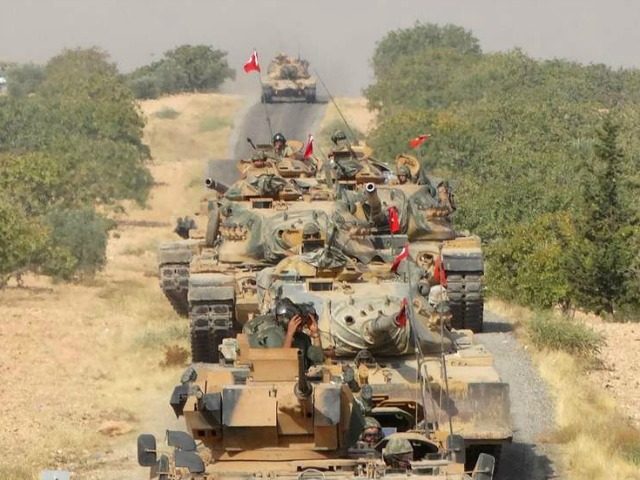HASSA, Turkey (AFP) — Turkey on Saturday launched a new air and ground operation to oust Kurdish militia from a northern Syrian enclave, defying US warnings that the action risked destabilizing the area.
Turkey had in recent days sent dozens of military vehicles to the border area and readied pro-Ankara Syria rebels in preparation for the operation against the People’s Protection Units (YPG) militia which Turkey deems to be a terror organization.
President Recep Tayyip Erdogan had repeatedly vowed that Turkey would root out “nests of terror” in Syria, despite warnings that the operation could be militarily tough and complicate relations with Washington and Moscow.
The foreign ministry of Russia, whose opinion is seen as crucial in determining how far the operation goes, said it had received the news of the campaign with concern and urged restraint.
Dubbing the new campaign operation “Olive Branch,” the Turkish army said it had begun at 1400 GMT and was aimed against the YPG and also Islamic State (IS) jihadists.
The army said the operation would respect Syria’s territorial integrity and was justified by Turkey’s rights under international law.
Huge plumes of smoke
An AFP correspondent on the Turkish side of the border saw two war planes launch air strikes inside Syrian territory, sending huge white plumes of smoke up into the early evening sky.
Prime Minister Binali Yildirim confirmed the air strikes.
Units of pro-Ankara rebels known by Turkey as the Free Syrian Army (FSA) also began moving into the Afrin area of Syria, which is controlled by the YPG, the state-run Anadolu news agency said.
The Turkish army has over the last two days shelled camps and refuges used by the YPG and Erdogan said earlier Saturday that Turkey had “de-facto” launched the operation.
Erdogan said that after Afrin, the forces would also seek to oust the YPG from Manbij, a town to the east that the Kurdish militia also holds.
A Turkish foreign ministry official said in the wake of the announcement of the air strikes that Foreign Minister Mevlut Cavusoglu held talks with US counterpart Rex Tillerson, at Washington’s request.
Turkey accuses the YPG of being the Syrian offshoot of the Kurdistan Workers’ Party (PKK) which has waged a rebellion in the Turkish southeast for more than three decades and is regarded as a terror group by Ankara and its Western allies.
But the YPG has been the key ally of Turkey’s fellow NATO member the United States in the fight against IS jihadists, playing a key role in pushing the extremists out of their Syrian strongholds.
But it was still unclear what form a Turkish ground operation will take, given the considerable political and military risks.
Warning from Damascus
Turkey from August 2016 to March 2017 pushed into Syria in its more than half-year Euphrates Shield operation in an area to the east of Afrin against both YPG and IS.
Syria’s Deputy Foreign Minister Faisal Mekdad warned on Thursday that the Syrian air force could destroy any Turkish warplanes used in the new offensive.
Analysts say that crucial for any major ground operation will be approval from Moscow which has a military presence in the area and a cordial relationship with the YPG.
In its first comments since the launch of the air strikes, the Russian foreign ministry said: “Moscow is concerned at this news. We call on the opposing parties to show restraint.”
With conspicuous timing, Turkey’s army chief General Hulusi Akar and spy chief Hakan Fidan were in Moscow on Thursday for talks on Syria.
“A full Turkish air and ground offensive will not take place without Moscow’s blessing,” said Anthony Skinner, director MENA at global risk consultancy Verisk Maplecroft, adding a full Turkish campaign is “not inevitable.”
Won’t serve regional stability
The Turkish threats of an intervention have also raised eyebrows in Washington, which has backed the YPG as it dislodged IS and gained control of the swathe of northern Syria up to the Iraqi border.
The YPG-held enclave of Afrin marks the westernmost extent of its control and Turkey wants to make sure it is kept well to the east of the Euphrates River.
“We do not believe that a military operation… serves the cause of regional stability, Syrian stability, or indeed Turkish concerns about the security of their border,” a senior US State Department official said on Friday.
But Erdogan accused the United States of not keeping its past promises that the YPG would clear out of Manbij.
“So nobody can object if we do what is necessary,” said Erdogan, threatening to pursue the operations up to the Iraqi border.
Erdogan reacted furiously this week to an announcement of plans to create a US-backed 30,000-strong border security force in northern Syria composed partly of YPG fighters, describing it as an “army of terror.”
US Secretary of State Rex Tillerson later said the “entire situation has been mis-portrayed, mis-described,” admitting “we owe them (Turkey) an explanation.”
“We don’t care what they say,” Erdogan spat back. “They will learn how wrong it is to trust a terror organization.”

COMMENTS
Please let us know if you're having issues with commenting.